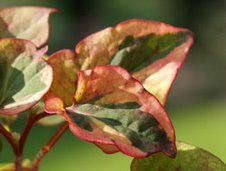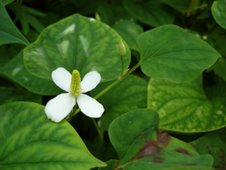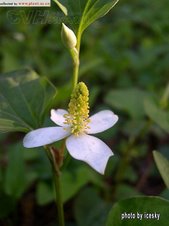Heartleaf (Khowtong): Security guard for your health
Heartleaf or Khowtong has the scientific name : Houttuynia cordata Thunbgenus Houttuynia, is a flowering plant native to Japan, southern China and Southeast Asia, where it grows in moist, shady places.
Houttuynia is a herbaceous perennial plant growing to between 20 and 80 cm. The proximal part of the stem is trailing and produces adventitious roots, while the distal part of the stem grows vertically. The leaves are alternate, broadly heart-shaped, 4-9 cm long and 3-8 cm broad. Flowers are greenish-yellow, borne on a terminal spike 2-3 cm long with 4-6 large white basal bracts.
Heartleaf is also known around the world such as :
Houttuynia cordata Thunb.
SYNONYM(S) : Gymnotheca chinensis Decne., Polypara cochinchinensis Lour.
CHINESE : Ji cai (Taiwanese tsi ts'ai), Yu xing cao (medicinal name).
DANISH : Houttuynia.
DUTCH : Houttuynia.
ENGLISH : Chinese lizard tail, Fish mint, Fish plant, Fishwort, Heartleaf , Himalayan spinach, Lizard's tail, Edible houttuynia, Heartleaf houttuynia, Vietnamese fish plant, White chaplu, Wild houttuynia.
FRENCH : Hottonie, Houttuynie.
GERMAN: Buntblatt, Chinesischer Eidechsenschwanz.
JAPANESE : Dokudami.
KOREAN : 약모밀 .LAOTIAN : Phak khao thong.
NEPALESE : Gandhe, Gane.
RUSSIAN : Xауттюйния сердцевидная, Хоуттуиния.
SLOVENIAN : Hutujnija.
SWEDISH : Hoyttynia.
THAI : ผักก้านตอง Phak kan tong, ผักคาวทอง Phak khao tong, ผักคาวตอง Phak khao tong (Northern Thailand), ผักเข้าตอง Phak khao tong, พลูแก Phlu kae (Central Thailand). พลูคาว
VIETNAMESE : Diếp cá, Giấp cá, Ngư tinh thảo, Rau dap ca, Vap ca.
FRENCH : Houttuynie à fleurs doubles.
ENGLISH : Coriander-scented houttuynia, Chinese houttuynia, Vietnamese houttuynia, Chinese lizard tail.
DANISH : Kamæleonblad.
DUTCH : Bonte houttuynia.
ENGLISH : Chameleon plant, Variegated houttuynia.
FRENCH : Houttuynia cordata panaché, Houttuynie caméléon, Houttuynie panachée.
GERMAN: Bunter Houttuynia, Chamäleonpflanze.
SWEDISH : Kameleontblad.
PLANTS Classification Report.
Kingdom
Plantae – Plants
Subkingdom
Tracheobionta – Vascular plants
Superdivision
Spermatophyta – Seed plants
Division
Magnoliophyta – Flowering plants
Class
Magnoliopsida – Dicotyledons
Subclass
Magnoliidae –
Order
Piperales –
Family
Saururaceae – Lizard's-tail family
Genus
Houttuynia Thunb. – houttuynia
Species
Houttuynia cordata Thunb. – chameleon
The plant grows well in moist to wet soil and even slightly submerged in water in partial or full sun. Plants can become invasive in gardens and difficult to eradicate. Propagation is via division.
Houttuynia in temperate gardens is usually in one of its cultivated forms, including: Chameleon (synonymous with H.c. 'Court Jester', H.c. 'Tricolour', H.c. 'Variegata') this variety is slightly less vigorous then the species and has leaves broadly edged in yellow and flecked with red; Flore Pleno has masses of white bracts and the vigour of the parent species.
Medicinal & Culinary Use
Grown as a leaf vegetable, particularly in Vietnam, where it is called giấp cá or diếp cá and is used as a fresh herbal garnish. The leaf has an unusual taste that is often described as fishy (earning it the nickname "fish mint"), so it is not enjoyed as universally as basil, mint, or other more commonly used herbs.
Houttuynia is also used in herbal medicine. The beverage dokudami cha (Japanese: ドクダミ茶; literally "Houttuynia cordata tea") is an infusion made from Houttuynia cordata leaves, Oolong tea leaves, and Job's Tears.[1]
In the southwestern Chinese provinces of Yunnan, Guizhou, and Sichuan, roots are used as a root vegetable. English names include heartleaf and lizardtail.
Usage: To be boiled briefly; of the fresh herb to be decocted or pounded to make juice for oral administration. For external use, appropriate quantity to be pounded into paste for topical application or made into hot decoction for fuming and washing of the lesion.
Researchers have discovered that the red color on the leaves of Khowtong has the medicinal chemicals, healthy bacteria, micro-organisms, and a type of lactobacilli which enhances the body’s immune system and inhibits the growth of cancerous cells. It is an anti-carcinoma and helps restrain the growth of cancer cells after radiation treatment, and operations on cancer of the breast, uterus, intestines, lungs, etc.The Khowtong herb can be extracted and made into a drink which has received registration with the government as a health supplement to be used in conjunction with medical radiation treatments. It helps stimulate the immune system of adult cancer patients. It enhances symptoms and helping extend life longer than radiation treatment itself.It is also been discovered the chemicals of Khowtong improve blood circulation which helps those suffering from paralysis, numb limbs, aching joints, gout, high or low blood pressure, high blood cholesterol, AIDS, allergies, constipation, hemorrhoids, and other diseases.The Pharmaceutical Properties of the Khowtong HerbHouttuynia cordata ThunbIt enhances the immune system by stimulating the division of white blood cells and improving the effectiveness of the macrophage white blood cells in destroyling the cancer cells that can grow in the lungs (A549), brain (XF498), tumors (SK-MEL-2), ovaries (SK-OV-3), large intestine (Hct-15) and five types of cancerous white blood cells (L1210, K526, RALA P, HR1)It inhibits the growth of mold and many types of bacteria (H.influenza, S.aurenus, Mold and Yeast. It kills the virus HSV-1, the virus HIV-1 and the Influenaz virus without destroying the host cell. It helps resist bronchitis by decreasing the production of Posta glandin which is a chemical that increases irritation.
This Information Concerning the Khowtong herb comes from the Herbal Medical Research Institute Ministry of Public Health, 2004


